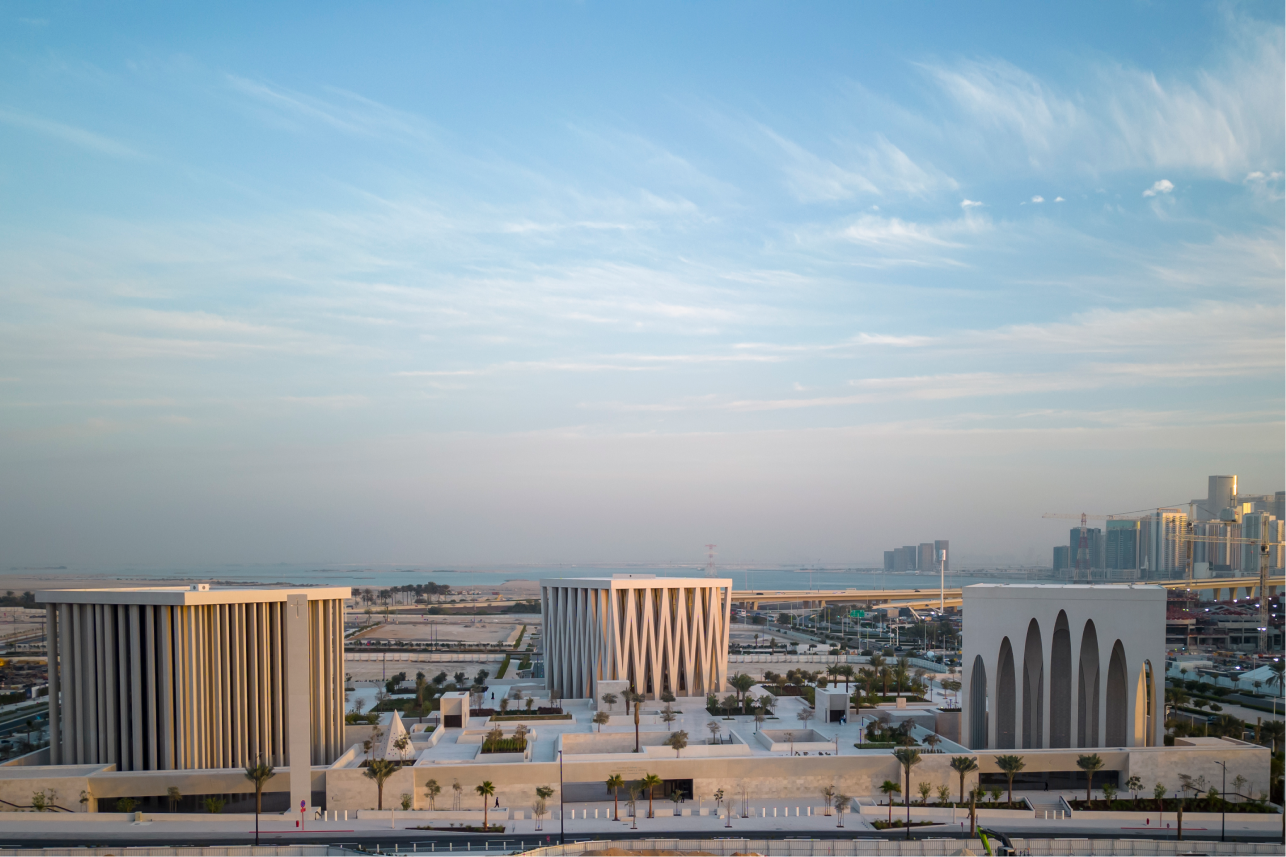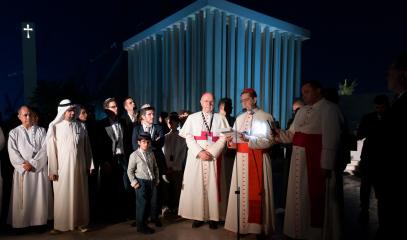Vicar of Arabia: Abraham's House a 'positive' model for a Holy Land at war
From Yemen, the Houthis attack southern Israel with drone strikes. Iran's supreme leader calls on Muslims (and Arabs) to rally against the Jewish State, starting with an economic boycott. Faced with the risk of an expansion of the war in Gaza, Msgr. Martinelli speaks of a "prophetic place" of "confrontation and peace". Do not bend religion to a "purpose of conquest". The Pope returns to the Emirates for COP28.
Rome (AsiaNews) - War in Gaza between Israel and Hamas, the Abraham Accords, interreligious dialogue between the representatives of the three monotheistic faiths which, in the first patriarch and progenitor of Jews and Arabs, find a common root.
The new conflict inflaming the Holy Land seen from the perspective of the Gulf shows the numerous implications for the entire Middle Eastern region, as underlined to AsiaNews by Mgr. Paolo Martinelli, apostolic vicar of southern Arabia (United Arab Emirates, Oman and Yemen).
This bond is now at risk, because from one of the territories of the vicariate (Yemen), the Houthi rebels - supported by Iran - have launched a drone attack towards Eliat, in southern Israel, in recent days in "retaliation" according to a senior official of the group, fuelling fears of an expansion of the conflict.
“Everything is connected”, these opposing ties and alliances “can play a role” not only for missile and drone attacks from a country, but in a “dialogue” perspective thinking about the Emirates and the Sultanate of Oman itself, which has strong relations with Iran.
“Even if – he admits – there are no great hopes at the moment”. In Rome in recent weeks to participate in the Synod, Msgr. Martinelli has maintained constant contact with collaborators in the vicariate on the evolution of the situation and to evaluate the repercussions of this new conflict.
“The projects are moving forward, also because the Emirates have had good relations with Israel since the Abraham Accords. Then there is the Abrahamic Family House inside which the work continues - he explains - although, in general. the security level has been raised."
“The Emirates - states the vicar - have the authority to promote dialogue” between the parties, as “in the past they created the Abrahamic House and hosted a meeting between Pope Francis and the great imam of al-Azhar” in 2019, with the signing of the document on brotherhood. Yesterday evening, the pontiff announced his intention to return to the Gulf country from 1 to 3 December to take part in COP28, the UN climate conference.
Msgr. Martinelli continues: "The hope is that the war does not interrupt the path started, it would be a step backwards that we must avoid in every way". On the contrary, the relationship that has been created and the fruits that have emerged so far have a "deeply prophetic value which, today, acquires even more value. By going beyond conflicts, in fact, it is possible to cultivate places of discussion and peace, where the common good is pursued and the relationship between religions is felt positively. This is why it is even more important to support him."
The Abrahamic Family House is the symbolic building of dialogue between faiths in the United Arab Emirates: it houses a church, a synagogue and a mosque and is one of the legacies of the pontiff's visit, during which the signing of the document on Human brotherhood with Ahmed el-Tayyeb, in the presence of over 400 religious leaders, to promote coexistence between peoples and fight extremism.
The "house" can be a "positive" model for the Holy Land: "Where today there is fighting - he explains - the three religions found themselves having to manage the difficulties of coexistence, they started from the conflicts and had to try to overcome them" observes the prelate.
He adds that in Abu Dhabi,"this relationship was desired positively, it does not start from a problem but from a desire, that is to be a sign for the world that we can live together, not just dialogue but actually living together".
Thus, Abraham's descendants "learn to know each other by overcoming prejudices, experiencing a path of sharing according to common values". From this perspective, a "strong, authoritative state" is important and the Emirates "are an example of this" while elsewhere - starting from the Israeli-Palestinian situation and a two-state solution that has never been implemented - there are different conditions.
As Card. Pierbattista Pizzaballa, Patriarch of Jerusalem of the Latins, the conflict that erupted following the Hamas attack on 7 October and Israel's subsequent military response is increasingly adding a religious element to the political sphere. In recent hours, Iran's supreme leader has called the Muslim (and Arab) world against Israel, starting with the blockade on food and oil imports.
The war has inflamed tempers and triggered attacks on Jews or Muslims, depending on the square, fuelling confessional tensions. The Vicar of Arabia recalls how the pope's and imam's document "insists precisely on this element: to avoid rooting conflicts in the religious sphere", excluding that violence can be committed "in the name of God. Religion,' he concludes, 'can move very deep feelings and forces, they are man's ultimate questions. It is the most intimate element of a person and to want to bend it to a purpose of conquest is to betray the religious experience in its truth'.








.png)










